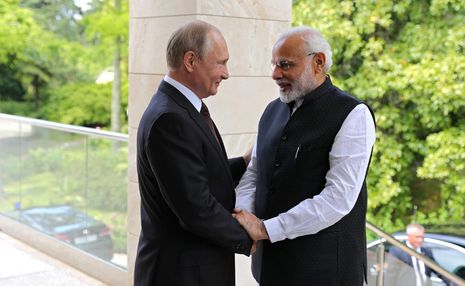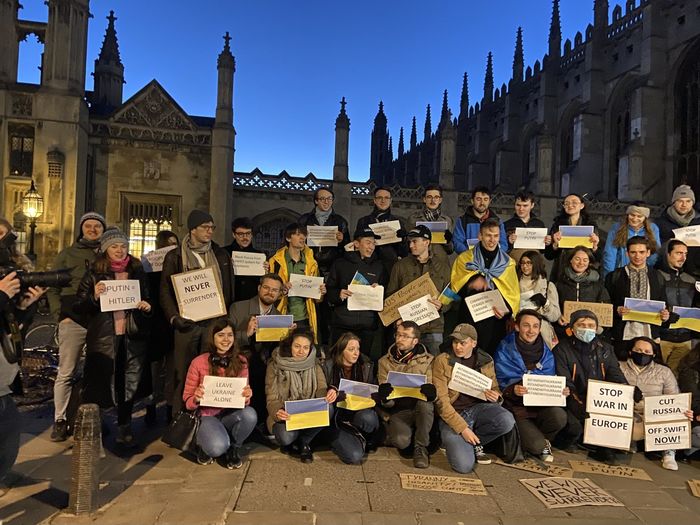Abstaining from morality: India and the war in Ukraine
Akshata Kapoor discusses the importance of India’s response to the war in Ukraine, arguing that it goes beyond neutrality into a tacit endorsement of authoritarianism

On 25th February, India abstained on a UN Security Council resolution condemning the Russian invasion of Ukraine. On the 27th, India abstained from a vote to convene an emergency session of the UN General Assembly. It was joined both times by China and the UAE.
When I heard this news, all I could feel was a heavy sense of shame. The same sense of shame that struck, again and again, over these past few years whenever the government of India exploited its power and undermined democracy. Only now, it was on the global stage, in a situation where right and wrong couldn’t be clearer. When I tweeted about this abstention, I received some replies from strangers telling me to go ‘learn geopolitics’ and another reminding me that ‘It’s not some woke issue we are dealing with’. At the same time, my mum, who has been a mild supporter of Modi’s government in the past (a cause of countless dinner table arguments) sent me a message from India saying: ‘Indian stock is on a roller coaster ride since the Ukraine-Russia disturbance. I wonder why India refuses to take a stand on this matter. Pathetic, if you ask me.’ Encouraged by my mum’s uncharacteristic message and the patronising replies to my tweet, I wanted to see why, despite the reasons listed by supporters of India’s decision, this foreign policy stance seems uniquely disturbing and detrimental to Indian interests.
“Russia and India have had a decades-long relationship built on weapons, energy, and border interests”
The support for an Indian abstention comes from armchair activists and foreign policy experts alike. The most common justifications involve preserving India’s diplomatic interests. Russia and India have had a decades-long relationship built on weapons, energy, and Russia’s UNSC veto power safeguarding India’s border interests. Putin visited Delhi in December 2021, and the two countries aim to significantly increase bilateral investment and trade. More vengeful commentators believe that move is the correct one based on Ukraine’s past lack of support for Indian foreign policy interests. Many are disillusioned by the West’s hypocritical rhetoric, which has opposed India securing its borders in the past. While the double standard of the West when it comes to invasions and wars is undeniable, India will only be able to wield accusations of hypocrisy to dig its own grave. Resistance to American hegemony cannot take shape on the grave of unalienable principles of international relations.
On a call with Putin that took place on the 24th, Prime Minister Modi urged an “immediate cessation of violence.” Many who support India’s diplomatic strategy but dislike the war seem to be convinced that India is internally pushing for peace. However, calling for peace without condemning violence absolves Russia of guilt: it allows Putin to continue peddling the narrative that Russia is fighting a ‘fascist’ government in Ukraine by objecting to general violence rather than pointing out Russia’s wilful warmongering and aggression. One of the major Indian publications that reported on this call wrote: “Putin briefed Modi on the recent developments in Ukraine as the Indian PM became the first global leader to speak to the Russian President following the launch of Russian special military operations in Ukraine.” The article proceeds to give, uncontextualized, the Russian reasons behind the invasion. The adoption of the Russian language of “special military operation” by an independent Indian news source betrays the dangers of India’s ineffectual and weak stance, allowing Russian propaganda to sustain India’s diplomacy.
Condemning India’s weak response, Shashi Tharoor, a former diplomat who is currently a Member of Parliament, wrote: “India did not even object to Russia’s ‘recognition’ of the ‘independence’ of the two separatist Ukrainian regions of Donetsk and Luhansk.” This observation illustrates why India’s complicity is so poignant. India itself has begun resorting to, on a smaller scale, the propaganda and undemocratic, aggressive politics championed by Russia in the build-up to the invasion of Ukraine. It was, after all, the current Modi government that unilaterally undermined Kashmiri democracy and the Indian constitution in stripping Kashmir of self-rule. As much as India needs Russia’s support to avert Chinese or Pakistani aggression, India is perhaps also happy to encourage impunity for border violence that is fuelled by undemocratic hate-mongering and propaganda.
“India cares about civilian casualties - but only when the civilians are Indian”
While Indian diplomats have encouraged peace talks, they have made no stronger statements calling out the invasion. This is ironic considering that the main focus of India’s response to the crisis has been to evacuate the thousands of Indian students stuck in Ukraine. TS Tirumurti, India’s permanent representative to the UN, in an attempt to clarify India’s stance, said: “We welcome today’s announcement by both sides to hold talks at the Belarus border [...] We continue to be deeply concerned about the safety and security of the Indian nationals including a large number of Indian students who are still stranded in Ukraine.” On March 1st, an Indian student lost his life during shelling in Kharkiv. India cares about civilian casualties - but only when the civilians are Indian.
While India has had a long history of remaining neutral during times of international conflict, India’s response this time seems more than a neutral call to peace. It is India refusing to acknowledge an invasion; voting in the same manner as China and UAE, two authoritarian countries; pursuing self-interest rather than global peace; protecting its own interests rather than leveraging its power with Russia to bring an end to the crisis. Even in 2014, our initial response to the annexation of Crimea was to affirm Indian support for preserving territorial integrity, a minimum but necessary statement that denounces invasion. While India has abstained on many crucial resolutions in the past, there has usually been some form of explicit condemnation and shock at the use of violence. Not this time. While India’s abstention from voting on the Russian invasion may be unsurprising, even inevitable, with this move the country’s historic moral doctrine of espousing peace and respecting sovereignty is being irrevocably compromised.
 News / Eight Cambridge researchers awarded €17m in ERC research grants27 December 2025
News / Eight Cambridge researchers awarded €17m in ERC research grants27 December 2025 News / News in Brief: carols, card games, and canine calamities28 December 2025
News / News in Brief: carols, card games, and canine calamities28 December 2025 News / Caius mourns its tree-mendous loss23 December 2025
News / Caius mourns its tree-mendous loss23 December 2025 Interviews / Meet Juan Michel, Cambridge’s multilingual musician29 December 2025
Interviews / Meet Juan Michel, Cambridge’s multilingual musician29 December 2025 Sport / Hard work, heartbreak and hope: international gymnast Maddie Marshall’s journey 29 December 2025
Sport / Hard work, heartbreak and hope: international gymnast Maddie Marshall’s journey 29 December 2025









